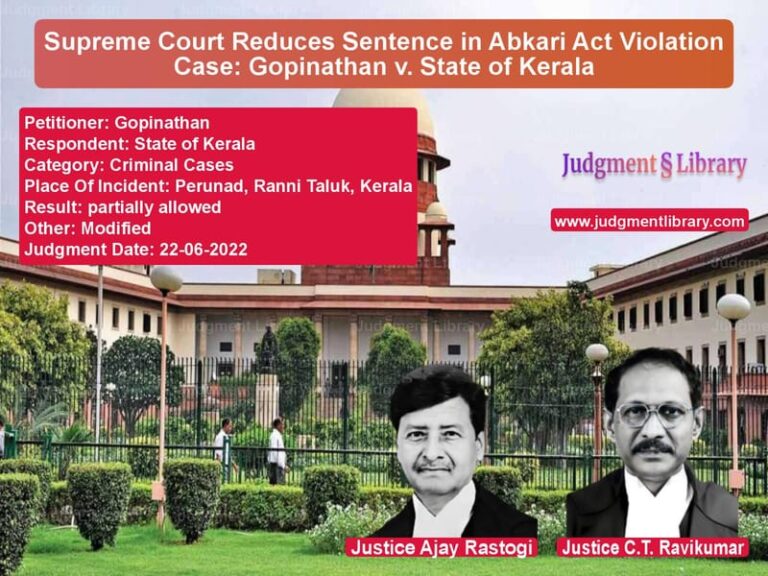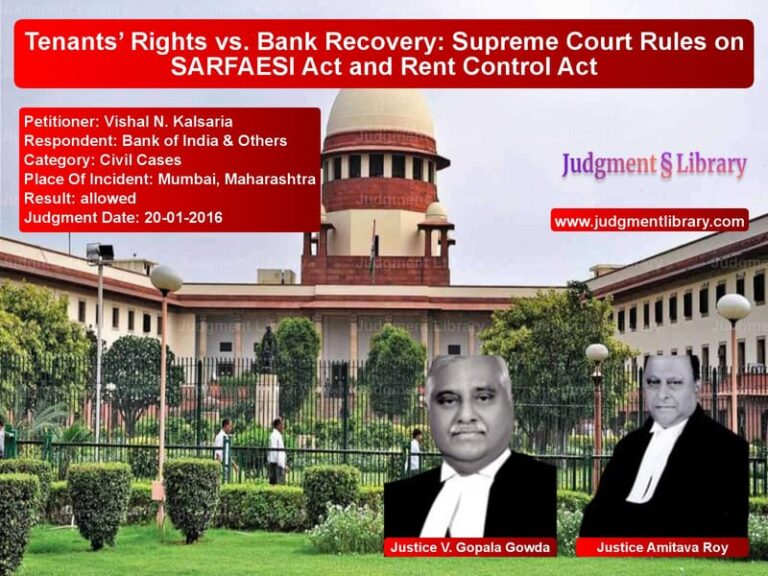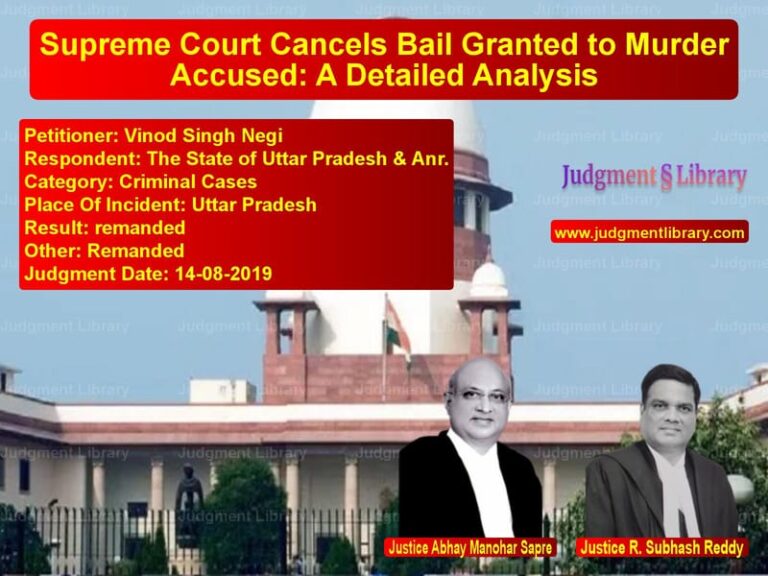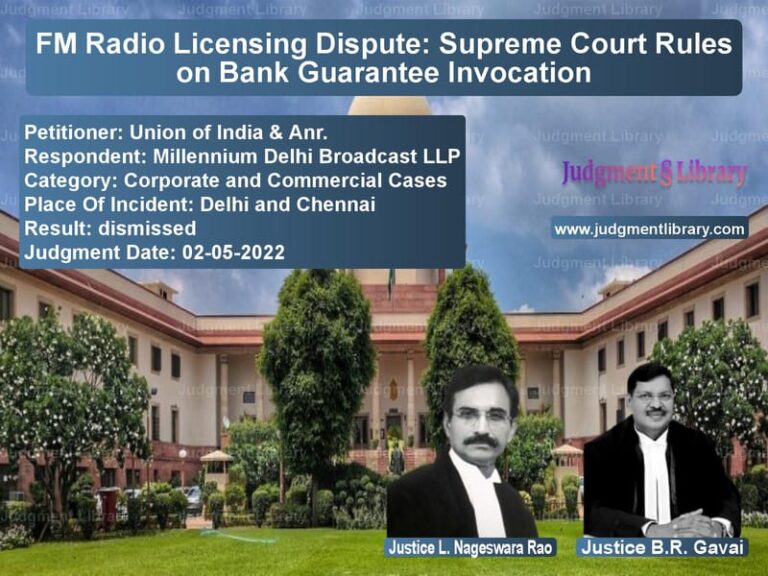SC Rejects Home Loan Interest Rate Dispute Against HDFC: Key Takeaways
The Supreme Court of India recently adjudicated a crucial case concerning home loan interest rates and alleged unfair trade practices by financial institutions. The case, Rajesh Monga vs. Housing Development Finance Corporation Limited & Ors., involved a dispute over fluctuating interest rates charged by HDFC on a home loan. The appellant, Rajesh Monga, challenged the increase in interest rates, contending that the hike was contrary to the assurances made at the time of sanctioning the loan.
The National Consumer Disputes Redressal Commission (NCDRC) had earlier dismissed the complaint, holding that the appellant was bound by the terms of the agreement. The Supreme Court upheld this ruling, emphasizing that once a borrower agrees to the terms of a contract, they cannot later dispute them unless there is evidence of malafide intent or statutory violations.
Background of the Case
The dispute arose when Rajesh Monga, seeking a home loan, was approached by representatives of HDFC in August 2005. Monga alleged that he was assured a lower rate of interest compared to ICICI Bank and that the interest rate would be linked to the Prime Lending Rate (PLR) of the Reserve Bank of India (RBI). Based on this assurance, he applied for a loan of ₹3.5 crore, which was sanctioned, and an agreement was executed on January 11, 2006.
As per the agreement:
- Interest was initially set at 7.25% per annum with a margin of 3.5%.
- The agreement mentioned that the rate would vary according to HDFC’s Retail Prime Lending Rate (RPLR).
- Contrary to Monga’s belief, the rate was not directly linked to the RBI’s PLR.
Despite no changes in the RBI’s PLR, HDFC subsequently increased the interest rate to 8.25%, then to 8.75%, 9.25%, and finally to 10.5%. Monga argued that these increases were arbitrary and violated the original understanding.
Key Issues Raised
1. Did HDFC Mislead the Borrower?
Monga contended that HDFC’s representatives assured him that the interest rate would be adjusted based on RBI’s lending rate and not at HDFC’s discretion. He cited an email dated October 5, 2005, which stated:
“PLR is decided by RBI, whereas FRR is decided by the individual bank. HDFC is the only institution working on PLR.”
Monga argued that this email was evidence of HDFC’s misleading conduct.
2. Was There a Violation of Consumer Rights?
Monga claimed that HDFC engaged in unfair trade practices by failing to honor its assurances and arbitrarily increasing interest rates. He relied on precedents where the courts ruled against financial institutions for misleading consumers.
3. Were the Terms of the Loan Agreement Unfair?
The appellant contended that the terms of the agreement, which allowed HDFC to vary interest rates at its discretion, were unfair and against the principles of natural justice.
Respondent’s Arguments (HDFC)
- HDFC countered that the loan agreement explicitly stated that the interest rate would be adjusted based on HDFC’s RPLR, not RBI’s PLR.
- It argued that Monga had voluntarily signed the agreement, which clearly outlined the bank’s right to revise interest rates.
- HDFC maintained that there was no evidence of coercion, fraud, or misrepresentation.
Supreme Court’s Observations
The Supreme Court ruled in favor of HDFC, making the following key observations:
1. Limited Scope of Judicial Review in Contractual Agreements
“Once parties have agreed to certain terms in a contract, courts should be reluctant to interfere unless there is clear evidence of fraud or statutory violations.”
2. No Evidence of Misrepresentation
The Court rejected Monga’s argument that he was misled by HDFC’s representatives. It held that the terms of the agreement were unambiguous and that the email cited by the appellant could not override the written contract.
3. Borrower’s Duty to Exercise Due Diligence
The Court emphasized that Monga was an informed borrower who had the option to seek loans from other financial institutions. Having voluntarily accepted HDFC’s terms, he could not later claim unfair treatment.
4. No Unfair Trade Practices
Referring to previous cases such as Texco Marketing (P) Ltd. v. TATA AIG General Insurance Co. Ltd., the Court held that unfair trade practices arise only when there is a deliberate attempt to mislead or deceive the consumer, which was not proven in this case.
Final Verdict
The Supreme Court dismissed Monga’s appeal and upheld the NCDRC’s ruling, stating:
“Having executed the agreement, having agreed to the terms and conditions, and having repaid the loan as per the agreement, the appellant cannot now seek to challenge the interest rate variations.”
Key Takeaways
- Binding Nature of Contracts: Once an agreement is signed, its terms are enforceable unless there is fraud or illegality.
- Due Diligence is Essential: Borrowers must thoroughly understand loan agreements before signing.
- Interest Rate Variations are Permissible: Financial institutions can revise interest rates if the agreement permits it.
- Judicial Restraint in Contractual Disputes: Courts will not interfere in commercial agreements unless there is clear injustice.
This ruling reinforces the principle that borrowers must be cautious before entering into financial agreements and that banks have the right to revise interest rates if permitted by contract terms.
Petitioner Name: Rajesh Monga.Respondent Name: Housing Development Finance Corporation Limited & Ors..Judgment By: Justice A.S. Bopanna, Justice M.M. Sundresh.Place Of Incident: India.Judgment Date: 04-03-2024.
Don’t miss out on the full details! Download the complete judgment in PDF format below and gain valuable insights instantly!
Download Judgment: rajesh-monga-vs-housing-development-supreme-court-of-india-judgment-dated-04-03-2024.pdf
Directly Download Judgment: Directly download this Judgment
See all petitions in Consumer Rights
See all petitions in Contract Disputes
See all petitions in Judgment by A. S. Bopanna
See all petitions in Judgment by M.M. Sundresh
See all petitions in dismissed
See all petitions in supreme court of India judgments March 2024
See all petitions in 2024 judgments
See all posts in Civil Cases Category
See all allowed petitions in Civil Cases Category
See all Dismissed petitions in Civil Cases Category
See all partially allowed petitions in Civil Cases Category







